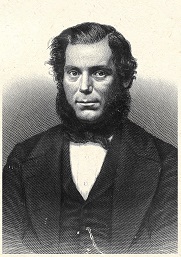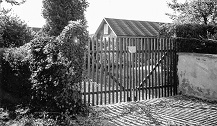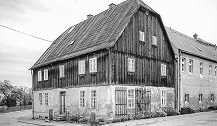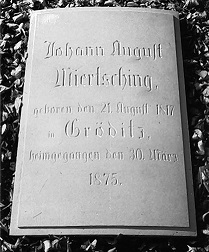Johann August Miertsching was an internationally acclaimed explorer and missionary.The following article about him was written by Trudla Malinkowa (Gertrud Mahling) for the August 2017 edition of Pomhaj Boh. It was translated from Upper Sorbian/Wendish by Gerald Stone.
Sites to Remind us of Jan Awgust Měrćink (John August Miertsching) in Lusatia.
On the 200th birthday of the Wendish missionary from the Herrnhut Moravian Church

His birthplace in Gröditz
Jan Awgust Měrćink (Johann August Miertsching) was born on 21 August 1817 in Gröditz, the son of a cottager and carpenter. His father Jan Měrćink was a Wend and his mother Erdmuth (née Naake) was a German, the daughter of a cobbler from the nearby little town of Weißenberg. Before he was three years old the little boy’s father died, whereupon his mother remarried, this time to Jozef Bareš (Baresch), a Czech by birth from the Čáslav region in central Bohemia. A further six children were born from the second marriage. His stepfather was a tailor whose income was small and the family lived in modest circumstances. Both his mother and stepfather came from the pietistic circles of the Herrnhut diaspora. The children grew up in a pious atmosphere and with three languages: the colloquial Wendish of the village, their mother’s German, and their father’s Czech.
Jan Awgust Měrćink (1817–1875)
Courtesy: Sorbisches Kulturarchiv, Bautzen
At the age of fifteen Jan Awgust Měrćink joined the Herrnhut Moravian Church parish. After the appropriate education in Kleinwelka and Herrnhut he was active as a missionary in Labrador from 1844 to 1849. After this, while he was spending a few weeks in his parents’ house in Gröditz, he received an invitation from England to participate as an interpreter in a great journey to the Arctic. The expedition lasted five years, during which Měrćink kept a detailed diary. It is said that after his return he prepared his diary for publication in his parents’ peaceful house in Gröditz. His book, the Reisetagebuch, was in great demand and went through three editions in a few years.
Měrćink’s birthplace was a poor cottage on the south-west edge of Gröditz. The single-storeyed, little thatched house used to stand on the western slope of a gulley or valley called Smoła (in German Smoa), which today has been to a large extent filled in. The older villagers remember the little house still being in use until the mid-twentieth century. In the 1930s a certain Kuba lived here, who used to make slippers, and after 1945 the Klutz family, refugees from Silesia. A few years after the War, probably around 1951, the surviving house, which was dilapidated and likely to collapse, was demolished. Sadly, no photograph of it is known to have survived.
 Today the property is surrounded by a fence and is used as a garden. On it stands an arbour, which may perhaps have been built on the foundations of Měrćink’s birthplace. The place is still known in the village as the Baresch garden. Its present-day address is Nowa dróha (Neue Straße) 17.
Today the property is surrounded by a fence and is used as a garden. On it stands an arbour, which may perhaps have been built on the foundations of Měrćink’s birthplace. The place is still known in the village as the Baresch garden. Its present-day address is Nowa dróha (Neue Straße) 17.
Photo: Trudla Malinkowa
Retirement in Kleinwelka
After Měrćink’s activity as a missionary among the Eskimos in Labrador the church authorities sent him as a missionary to the opposite end of the earth, to south Africa. In preparation for that he married a young teacher from Herrnhut. From 1856 for thirteen years the couple worked among the Hottentots. After tormenting labours and the death of four of their children they returned in April 1869 to their homeland and to Kleinwelka. There, in December that year, his wife died. Měrćink, though only fifty-two years old, took retirement.
The Měrćink family had found itself a house which had belonged to the Šćěpank family in the neighbourhood of the Gruhl bell foundry. Two stories high, it had been built in Klein Neida in 1787 by Jan Šćěpank (Schippang) from Klein Neida. It was the thirty-fourth house to have been built in that new settlement following the foundation of the Herrnhut Moravian colony at Kleinwelka. For many years one of the relatives generally known as ‘Gemüse-Schippang’ ran a greengrocer’s shop here. After remaining in the family’s hands until 1869, it passed in 1870 into the ownership of the parish. Because until 1902 it was overgrown with ivy, it was called ‘Efeuhaus’ (ivy house).

In this house Jan Awgust Měrćink lived out the years of his retirement, looked after by his half-sister from Gröditz. It was probably here too that he died on 30 March 1875, only fifty-eight years old, leaving behind his aged mother and two young daughters, Maria and Helena.
Unfortunately, the house has been empty for many years and is in need of renovation. Its present address is Friedricha Gruhlowa dróha 2 (Friedrich-Gruhl-Strasse 2).
The house in Kleinwelka,
where Missionary Měrćink spent his retirement.
Photo: Trudla Malinkowa
The grave in Kleinwelka
Jan Awgust Měrćink was buried in the cemetery of the Moravian parish in Kleinwelka. His grave is in the third row of plot nine of the cemetery in the so-named ‘Brothers’ Plot’ (Brüderbeet). Following the custom of the Moravian church, it is of simple form, like the others. On the grass there lies a sandstone flag with a domed surface into which there is carved in gothic letters the words in German: ‘Johann August/Miertsching/born 21 August 1817/ in Gröditz/went home 30 March/1875’. An additional plaque with his name and the dates of his birth and death draws attention to his last resting place.
 On the 130th anniversary of J. A. Měrćink’s death in 2005 the Wendish Lutheran Association had his gravestone renovated. The Kleinwelka Moravian Church of the Brethren and the Foundation for the Wendish People also participated financially. Because the original stone was beyond repair, the sculptor Uwe Konjen from Bautzen made a copy. The renovated grave was unveiled in the course of the meeting of the Wendish Lutheran Association on Reformation Day 31 October 2005. A brief bilingual address was given by the Pastor of Kleinwelka, Christine Welschen and the Wendish (Sorbian) Superintendent Jan Malink. Before the ceremony in the cemetery the late Alfons Frencl from Rosenthal gave a talk to members of the Association in Wendish about the life and activities of Měrćink, after which he repeated his speech in German for the Kleinwelka parishioners.
On the 130th anniversary of J. A. Měrćink’s death in 2005 the Wendish Lutheran Association had his gravestone renovated. The Kleinwelka Moravian Church of the Brethren and the Foundation for the Wendish People also participated financially. Because the original stone was beyond repair, the sculptor Uwe Konjen from Bautzen made a copy. The renovated grave was unveiled in the course of the meeting of the Wendish Lutheran Association on Reformation Day 31 October 2005. A brief bilingual address was given by the Pastor of Kleinwelka, Christine Welschen and the Wendish (Sorbian) Superintendent Jan Malink. Before the ceremony in the cemetery the late Alfons Frencl from Rosenthal gave a talk to members of the Association in Wendish about the life and activities of Měrćink, after which he repeated his speech in German for the Kleinwelka parishioners.
The grave of J.A. Měrćink in Kleinwelka.
Photo: Trudla Malinkowa
Trudla Malinkowa
]]>